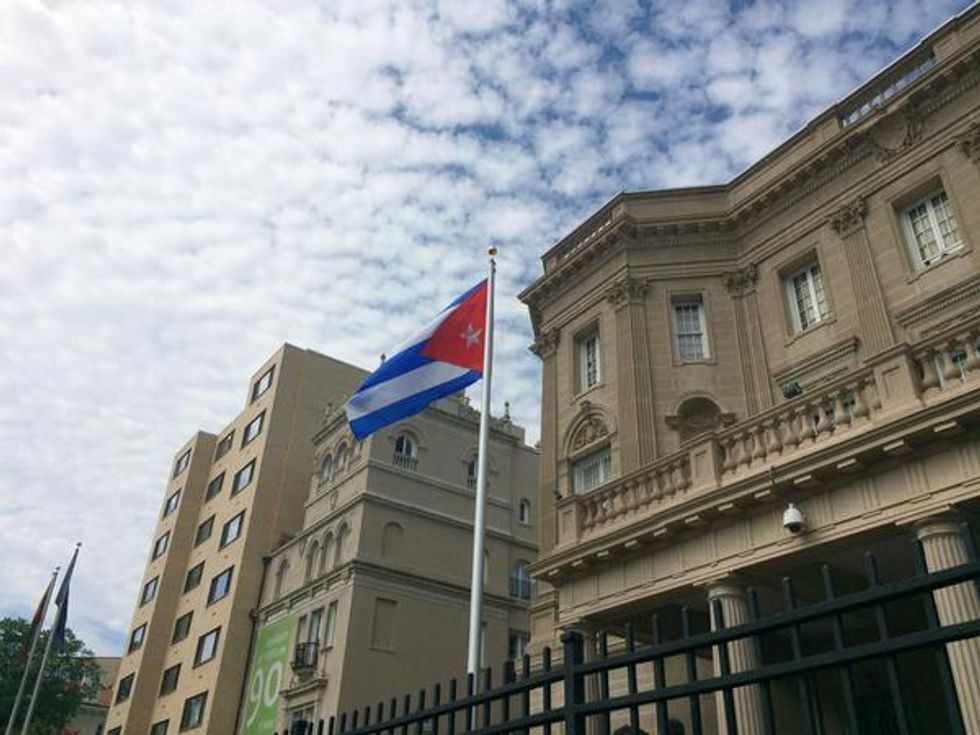
Image source: Twitter

WASHINGTON (AP) — Cuba's blue, red and white-starred flag was hoisted Monday at the country's embassy in Washington in a symbolic move signaling the start of a new post-Cold War era in U.S.-Cuba relations.
Shouts of "Viva Cuba!" As Cuban flag is raised outside embassy on 16th St in Washington DC, anthem is sung pic.twitter.com/KklwGrwSJ0
— Julie Davis (@juliehdavis) July 20, 2015Cuban Foreign Minister Bruno Rodriguez presided over the flag-raising ceremony hours after full diplomatic relations with the United States were restored at the stroke of midnight, when an agreement to resume normal ties on July 20 took effect. Earlier, without ceremony, the Cuban flag was hung in the lobby of the State Department alongside those of other countries with which the U.S. has diplomatic ties. U.S. and Cuban diplomats in Washington and Havana had also noted the upgrade in social media posts.
Several hundred people gathered on the street outside the embassy, cheering as the Cuban national anthem was played and three Cuban soldiers in dress uniforms stood at the base of the flagpole and raised the flag.
The United States and Cuba severed diplomatic relations in 1961 and since the 1970s had been represented in each other's capitals by limited service interests sections. Their conversion to embassies tolled a knell for policy approaches spawned and hardened over the five decades since President John F. Kennedy first tangled with youthful revolutionary Fidel Castro over Soviet expansion in the Americas.
Rodriguez is to meet later with Secretary of State John Kerry and address reporters at a joint news conference. Kerry will travel to Havana Aug. 14 to preside over a flag-raising ceremony at the U.S. Embassy there.
Shortly after midnight, the Cuban Interests Section in Washington switched its Twitter account to say "embassy." In Havana, the U.S. Interests Section uploaded a new profile pictures to its Facebook and Twitter accounts that says US EMBASSY CUBA. And, Conrad Tribble, the deputy chief of mission for the United States in Havana, tweeted: "Just made first phone call to State Dept. Ops Center from United States Embassy Havana ever. It didn't exist in Jan 1961."
Though normalization has taken center stage in the U.S.-Cuba relationship, there remains a deep ideological gulf between the nations and many issues still to resolve. Among them: thorny disputes such as over mutual claims for economic reparations, Havana's insistence on the end of the 53-year-old trade embargo and U.S. calls for Cuba to improve on human rights and democracy. Some U.S. lawmakers, including several prominent Republican presidential candidates, have vowed not to repeal the embargo and pledged to roll back Obama's moves on Cuba.
Still, Monday's events cap a remarkable change of course in U.S. policy toward the communist island under President Barack Obama, who had sought rapprochement with Cuba since he first took office and has progressively loosened restrictions on travel and remittances to the island.
Obama's efforts at engagement were frustrated for years by Cuba's imprisonment of U.S. Agency for International Development contractor Alan Gross on espionage charges. But months of secret negotiations led in December to Gross's release, along with a number of political prisoners in Cuba and the remaining members of a Cuban spy ring jailed in the United States. On Dec. 17, Obama and Cuban President Raul Castro announced they would resume full diplomatic relations.
Declaring the longstanding policy a failure that had not achieved any of its intended results, Obama declared that the U.S. could not keep doing the same thing and expect a change. Thus, he said work would begin apace on normalization.
That process dragged on until the U.S. removed Cuba from its list of state sponsors of terrorism in late May and then bogged down over issues of U.S. diplomats' access to ordinary Cubans.
On July 1, however, the issues were resolved and the U.S. and Cuba exchanged diplomatic notes agreeing that the date for the restoration of full relations would be July 20.
Some 500 guests, including a 30-member delegation of diplomatic, cultural and other leaders from the Caribbean nation, attended the Cuban ceremony at the stately 16th Street mansion in Washington that has been operating as an interests section under the auspices of the Swiss embassy. The U.S. was represented at the event by Assistant Secretary of State for Western Hemisphere Affairs Roberta Jacobson, who led U.S. negotiators in six months of talks leading to the July 1 announcement, and Jeffrey DeLaurentis, the chief of the U.S. Interests Section in Havana who will now become charge d'affaires.
Although the Interests Section in Havana won't see the pomp and circumstance of a flag-raising on Monday, workers there have already drilled holes on the exterior to hang signage flown in from the U.S., and arranged to print new business cards and letterhead that say "Embassy" instead of "Interests Section." What for years was a lonely flagpole outside the glassy six-story edifice on Havana's seafront Malecon boulevard recently got a rehab, complete with a paved walkway.
Every day for the last week, employees have been hanging hand-lettered signs on the fence counting down, in Spanish, to Monday: "In 6 days we will become an embassy!" and so on.